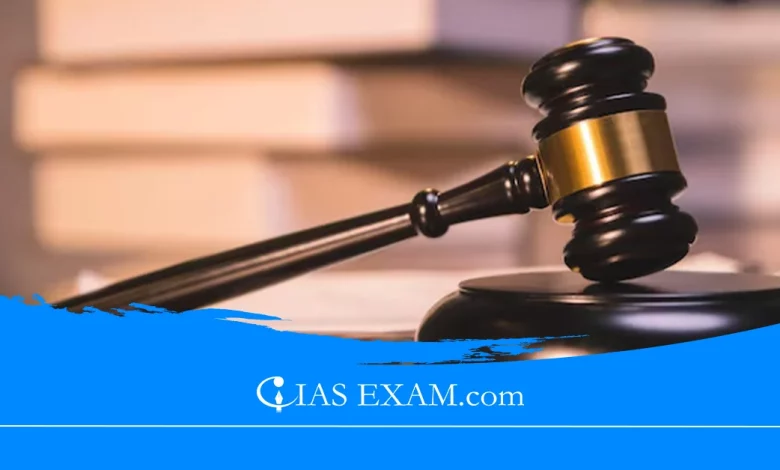Daily Current Affairs for UPSC
Section 82 of Code of Criminal Procedure (CrPC)
Syllabus- Polity & Governance [GS Paper-2]

Context
Recently the Supreme Court held that an accused would not be entitled to pre-arrest bail if the non-bailable warrant and the proclamation under Section 82(1) Code of Criminal Procedure (CrPC) is pending against him.
About
- It offers for the issuing of a proclamation in a case in which the court has reason to believe that the person has concealed himself or has absconded in order to evade the execution of warrants issued against him.
- The court might also form its opinion suo motu from the material on a record or on the presentation of evidence by the prosecution.
- Through a written proclamation, the courtroom orders the accused to appear at a specific place, and a specific time should be given; it should not be less than 30 days from the date of publishing of the proclamation.
- The provisions under this section are not for punishing the accused but have the only reason of compelling him to appear before the court. Therefore, a proclamation cannot be issued without first issuing a warrant.
- The issuing of the proclamation can not be executed in an arbitrary way, but there need to be motives recorded by the court to confirm the order of the proclamation.
- Subsection (2) of Section 82 deals with the method through which a proclamation is issued. The provision provides that the proclamation will be posted as follows:
- It is read in a few conspicuous places in the town or village in which the accused person often is living.
- It is affixed at some conspicuous part of the residence where such someone ordinarily resides. It also can be fixed in a few conspicuous parts of town or village.
- The proclamation also can be circulated by an everyday newspaper circulated in the region wherein the person basically is living.
Proclaimed Offender
- A person who is accused of significant offences under the Indian Penal Code (IPC), 1860, if he fails to appear as consistent with the requirements of the proclamation, the court can declare him a proclaimed offender after inquiring into the matter.
- A police officer can arrest someone who has been declared a proclaimed perpetrator without any warrant. Even a private person can arrest a proclaimed offender and present him to the nearest police station.
- The title of proclaimed offender ceases to exist as soon as the person is arrested or otherwise becomes capable of being presented before the court.
- A proclaimed offender shall be responsible for a term of imprisonment that can increase to seven years and shall also be liable to a fine in tandem with such a punishment.
Difference among Proclaimed Offender and Proclamation
- A proclamation is a word to the accused, who’s believed by the court to have absconded or hid himself to stay away from execution of warrants, while, proclaimed offender is a title this is conferred upon someone in opposition to whom a proclamation has been published and also who’ve devoted a severe offence.
- The title of a proclaimed perpetrator is asserted after an inquiry is performed through the court docket, in which the court has to verify that such someone has been intentionally hiding to evade the execution of warrants.
- The title of proclaimed offender opens up the person to penal liabilities and also to other disqualifications.
Source: The Hindu
UPSC Mains Practice Question
Q.Criminal Justice System in India (CJSI) has been in a state of peril. Discuss the major issues and suggest way forward to reform the CJSI. (250 words)





.png)



